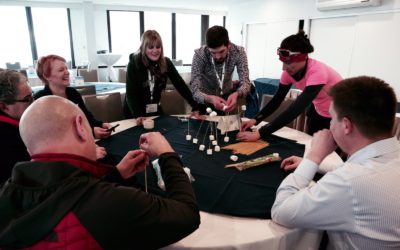Organizations are complex structures that cannot run without having people who have developed and nurtured trust to have tasks accomplished with openness and integrity. The elusive nature of trust has made the importance of trust building activities extremely relevant, as building trusted relationships is one of the most challenging aspects that continue to impede productivity and good employee-employer relationships.
In a recent study, Watson Wyatt found that only two out of five employees have trust in the executives in an organization. However, the study reveals that organizations can help build trust through trust building activities for executives.
TRUST BUILDING ACTIVITIES FOR EXECUTIVES
The process of learning how to build trust, credibility, and openness among senior executives focuses on the development of sustainable trust and what Lencioni called “vulnerability-based trust”. Through such trust building activities, leaders can move from their individual weaknesses and advance on the table to share their experiences. This has the net effect of creating powerful and effective decisions that employees and senior management can act on to realize optimal productivity. Building trust is important and cannot be an easy task, yet it remains the pillar of high performance among executive teams.
HOW TO BUILD TRUST IN AN ORGANIZATION
The executive leadership teams are expected to make employees feel trusted, valued and believe that managers and the employer are determined to prove their integrity and concern for their welfare. With a series of informal or casual get-togethers, that involves executives and their juniors, different groups in an organization can begin to share their experiences at a personal level and begin building trust at an organizational level.
Experience and research show that such get-togethers and trust building activities are extremely important in helping eliminate doubts and growing positive thoughts between teams and their members.
ESTABLISH TRUST WITH TEAM BUILDING ACTIVITIES
Team building activities through formal and casual arrangements can help create strong foundations that can support the tendency of collective decision-making. This means that these activities help promote a proactive decision-making process about tasks that need to be done, when, how, and who will be the active players in accomplishing the tasks for the effective realization of expected results.
BUILD TRUST BY SHOWING ACCOUNTABILITY
These trust building activities also help team executives to learn the role of accountability and commitment of the seniors in generating uniform trust necessary for producing high-performance results. Surveys show that little or absolute lack of accountability of team behavior is woefully imminent and explains why most organizations, despite having sufficient human resources, are unable to achieve strategic, as well as operational success.
These activities prepare leadership team members to act frankly, candidly, and openly when carrying out their managerial functions. Team leaders can share freely and sincerely their past misgivings, missteps, not so successful experiences and fears through trust building activities. This, according to team building experts, builds fascinating and positive results because of confidence established among team players and their seniors.
EXPLORE MORE TRUST BUILDING ACTIVITIES
Organizations cannot develop or maintain lasting employee trust, but people can. Team building activities are organizational strategies, practices and policies that can help promote trust, which is an interpersonal experience that supports sustainable productivity.


